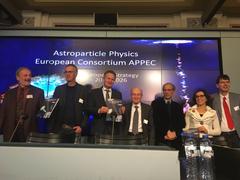URL: https://www.desy.de/news/news_search/index_eng.html
Breadcrumb Navigation
DESY News: European astroparticle physicists present their strategy in Brussels
News
News from the DESY research centre
European astroparticle physicists present their strategy in Brussels
Astroparticle physicists from across Europe have gathered on January 9th in Brussels, alongside their international colleagues and important guests from the European Commission, for the official announcement of the new strategy by the Astroparticle Physics European Consortium (APPEC) which will guide the community’s recommended research priorities over the next ten years.

The new astroparticle physics strategy has been officially launched and presented to Robert-Jan Smits (third left), Director General of DG Research and Innovation (RTD) at the European Commission France A. Córdova, Director of the National Science Foundation (NSF in USA) and Giorgio Rossi (first left), chairman of the European Strategy Forum on Research Infrastructures (ESFRI) in the presence of the scientific and funding community.
Astroparticle physics is a relatively new and rapidly growing field that is already achieving important results, the most recent and well-known being the first detection of gravitational waves that has opened a new era of multi-messenger astronomy and earned the field the 2017 Nobel Prize for physics.
Gravitational waves, neutrino, dark matter and gamma ray research are high on the list of research priorities being recommended with the launch of the latest European astroparticle physics strategy.
The new APPEC roadmap includes three relevant astroparticle research areas:
- the simultaneous study of cosmic messengers (charged cosmic rays, electromagnetic radiation, neutrinos and gravitational waves) emitted from the highest energy cosmic sources in the Universe (multi-messenger approach);
- a detailed study of the most mysterious and elusive elementary particle, the neutrino;
- the exploration of the “dark side of the Universe” (dark matter and dark energy) together with a study of all its evolution from the Big Bang (cosmology, study of the cosmic microwave background radiation).
Christian Stegmann, representative of the DESY Directorate in Zeuthen and member of the General Assembly of APPEC comments: “The roadmap documents the excellent alignment of astroparticle physics in Germany and DESY in particular with efforts in Europe. For us at DESY the roadmap motivates us to continue on our path.”
APPEC is calling for continued experimental efforts and funding support in these areas in particular through big projects endorsed by the consortium and community such as the Cherenkov Telescope Array (CTA), the Cubic Kilometre Neutrino Telescope (KM3NeT), future gravitational interferometers (the Einstein Telescope) and a substantial upgrade of our underground research infrastructures (the Gran Sasso laboratory, in particular). The report also includes recommendations addressing, in addition to the scientific issues, crucial organisational aspects as well as important societal issues such as gender balance, education, public outreach and relations with industry.
„The roadmap identifies CTA as the first large research infrastructure in high-energy astroparticle physics in Europe. At DESY we are proud to be in a lead role in CTA and to host the CTA Science Data Management Centre in Zeuthen. We will continue to play an important role in the implementation of the roadmap and in APPEC in the future,” said Christian Stegmann at the launch event in Brussels.



